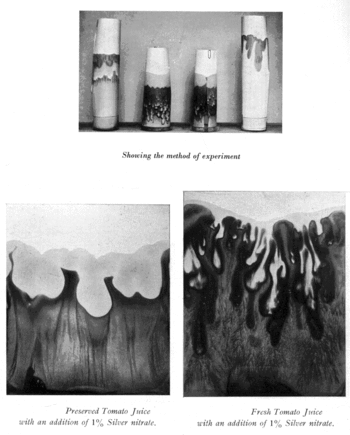Image forming method

Image forming methods are procedures for the quality representation of organic material, water and aqueous solutions and mixtures. The analysis of the ingredients (analytics) of foodstuffs only partially covers the quality. Their "vital quality", "vitality" or "inner quality" can be assessed by imaging methods. These image-creating methods are not to be confused with the imaging methods that are usually used in technology and medicine to depict the inner physical structures of the organism or technical products.
The best known imaging methods are the capillary dynamolysis of Lili Kolisko and Rudolf Hauschka (Wala), the copper chloride crystallisation of Ehrenfied Pfeiffer, and the round filter chromatogram, which were developed on the basis of questions that go back to Rudolf Steiner.
The principle of these examination methods is to add a sample to a system in which a structure-forming process takes place due to an instability inherent to the system (non-equilibrium system). The resulting structures are evaluated according to morphological criteria (in the case of copper chloride crystallisation, for example, type, number and order of the branches, properties of the texture that can be measured with computer image analysis) and assessed with regard to the object of investigation.
The majority of image forming methods are not scientifically recognised, but some have gained limited importance in the food industry (natural foods) and for water analysis (drip image method).
See also
Literature
- J.-O. Andersen: Development and application of the biocrystallisation method. Biodynamic Research Association, Denmark, Report No. 1, 2001
- J.-O. Andersen et al.: Comparative study between biocrystallisation and chemical analysis of carrots (Daucus carota L.) grown organically using different levels of green manures. Biological Agriculture and Horticulture 19, 29-48, 2001
- J.-O. Andersen et al.: Computerised image analysis of biocrystallograms originated from agricultural products. Computers and electronics in agriculture 22, 51-69, 1999
- J.-O. Andersen et al.: A refined biocrystallisation method applied in a pictomorphological investigation of a polymer. Elemente der Naturwissenschaft 68, 1-20, 1998
- E. Pfeiffer: Studium von Formkräften an Kristallisationen. Dornach, 1931
- E. Pfeiffer: Empfindliche Kristallisationsvorgänge als Nachweis von Formkräften im Blut. Verlag E. Weise, Dresden, 1935
- A. und O. Selawry: Die Kupferchlorid-Kristallisation in Naturwissenschaft und Medizin. Gustav Fischer Verlag, Stuttgart, 1957
- A. Fyfe: Die Signatur des Mondes im Pflanzenreich. Verlag Freies Geistesleben, Stuttgart, 1967
- Dittmar Jahnke: Morphologische Typisierung von Tropfenbildversuchen und Tropfenbildern. Morphologische Unterscheidungsmerkmale für die Auswertung von Wasserqualitäts-Untersuchungen mit der Tropfenbildmethode. Sensibles Wasser 2, Herrischried 1993, ISBN 3-931719-01-4
- Andreas Wilkens, Michael Jacobi, Wolfram Schwenk: Die Versuchstechnik der Tropfbildmethode - Dokumentation und Anleitung. Sensibles Wasser 5, Herrischried 2000, ISBN 3-931719-04-9
- Wolfram Schwenk (Hrsg.): Schritte zur positiven Charakterisierung des Wassers als Lebensvermittler. Ausgewählte Texte aus 40 Jahren Wasserforschung mit der Tropfbildmethode. Sensibles Wasser 6, Herrischried 2001, ISBN 3-931719-06-5
